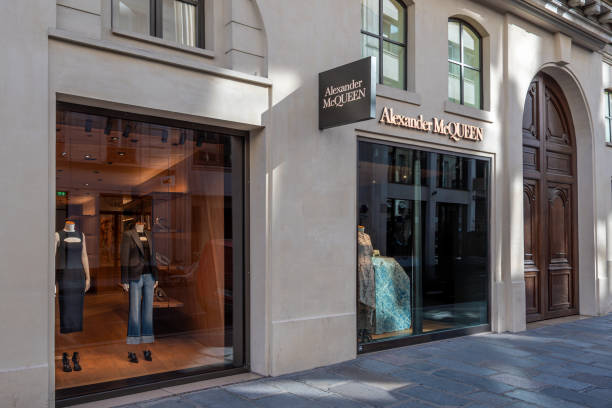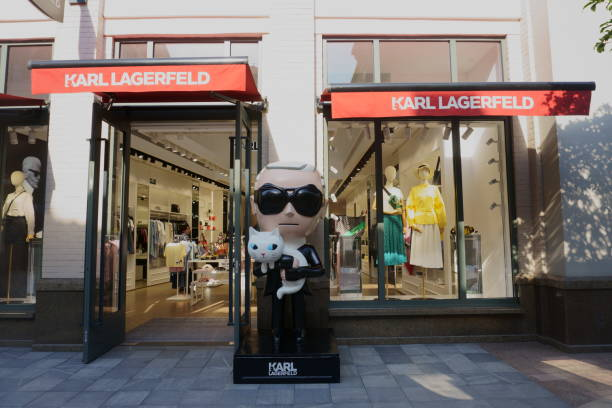The 21st century has borne witness to a vibrant evolution in the fashion world, driven by some of the most iconic designers of our time. These trailblazers have not only set trends but have also redefined the industry with their innovative designs, sustainable practices, and visionary aesthetics. This article delves into the contributions of these remarkable individuals and explores the unique elements that have cemented their status as fashion icons.
Karl Lagerfeld: The Creative Visionary

Karl Lagerfeld, the legendary fashion designer behind the modern renaissance of Chanel, is a monumental figure in the fashion industry. His visionary approach seamlessly fused contemporary and classic styles, breathing new life into the venerable fashion house. Beyond Chanel, Lagerfeld also had significant stints with Fendi and his own label, showcasing his versatility and undeniable talent.
Lagerfeld’s unique ability to blend high fashion with commercial appeal ensured his designs were both aspirational and accessible. His iconic looks, from the little black dress to the cascading tweed suits, remain timeless. In addition to his design work, Lagerfeld was also known for his distinctive personal style, characterized by his powdered white ponytail, dark sunglasses, and fingerless gloves.
Alexander McQueen: The Enigmatic Genius
Alexander McQueen, often referred to as the ‘enfant terrible’ of British fashion, was renowned for his boundary-pushing designs and theatrical runway shows. McQueen’s approach was deeply rooted in contradiction; he beautifully merged elements of beauty and grotesque, romance and rebellion. His collections often told a story, characterized by meticulous craftsmanship and groundbreaking silhouettes.
One of McQueen’s most significant contributions to fashion was his ability to transform clothing into art. His daring vision and avant-garde concepts were not just about fashion but about challenging perceptions and provoking thought. Iconic collections like ‘Highland Rape’ and ‘Savage Beauty’ showcase his unparalleled creativity and enduring impact on the industry.
Stella McCartney: The Sustainable Advocate
Stella McCartney has carved a niche for herself in the fashion industry with her staunch advocacy for sustainable and ethical fashion. Unlike many of her contemporaries, McCartney’s commitment to eco-friendly practices has been a cornerstone of her brand since its inception. She has actively promoted the use of organic materials, cruelty-free practices, and environmental awareness.
McCartney’s designs are characterized by their elegant simplicity, modern cuts, and timeless appeal. She has proved that sustainability and luxury are not mutually exclusive. Through her continued efforts, McCartney is not only reshaping the fashion landscape but also encouraging a new generation of designers to prioritize the planet.
Virgil Abloh: The Streetwear Pioneer
Virgil Abloh has revolutionized the world of fashion with his mastery of streetwear and his role as the Artistic Director for Louis Vuitton’s menswear. Abloh’s journey from an architectural background to fashion design is a testament to his multidisciplinary talents and innovative thinking. His brand, Off-White, has become synonymous with contemporary streetwear, blending luxury fashion with urban sensibilities.
Abloh’s designs often incorporate elements of irony, social commentary, and cultural references, making them relatable and highly sought after. His collaborations with major brands like Nike and IKEA further showcase his ability to transcend traditional fashion boundaries. By democratising high fashion, Abloh has left an indelible mark on the industry, opening doors for future generations of diverse talents.
Gucci’s Alessandro Michele: The Eclectic Innovator
Alessandro Michele, the creative force behind Gucci’s dramatic revival, has captivated the fashion world with his unique vision and eclectic style. Michele’s approach is characterized by a bold blend of vintage and contemporary elements, rich textures, and intricate detailing. His flamboyant designs have redefined modern luxury and set new standards in fashion.
One of Michele’s significant achievements is his ability to breathe new life into Gucci, transforming it from a staid heritage brand into a vibrant, energetic frontrunner in the fashion industry. His collections often draw inspiration from diverse cultural and historical references, creating a layered narrative that resonates with a global audience. Michele’s innovative mindset continues to inspire and shape the future of fashion.
Conclusion
The 21st century has seen a host of fashion designers who have not only made significant contributions to their craft but have also influenced broader cultural and social trends. From Karl Lagerfeld’s timeless elegance to Alexander McQueen’s provocative artistry, Stella McCartney’s commitment to sustainability, Virgil Abloh’s streetwear revolution, and Alessandro Michele’s eclectic innovation, these designers have left an indelible mark on the fashion industry. Their legacies continue to inspire and challenge the boundaries of fashion, setting the stage for future generations of creative minds.
FAQs
1. Who is considered the most influential fashion designer of the 21st century?
While it’s subjective, many consider Karl Lagerfeld to be among the most influential due to his transformative work with Chanel, Fendi, and his own label.
2. What makes Stella McCartney unique in the fashion industry?
Stella McCartney is unique for her unwavering commitment to sustainable and ethical fashion, using organic materials and cruelty-free practices in her designs.
3. Why is Alexander McQueen known as the ‘enfant terrible’ of British fashion?
Alexander McQueen earned this title because of his rebellious and provocative designs that often challenged societal norms and pushed the boundaries of traditional fashion.
4. How did Virgil Abloh impact the fashion industry?
Virgil Abloh impacted the fashion industry by popularizing streetwear and blending it with high fashion, making it accessible and relatable to a broader audience. His role at Louis Vuitton further cemented his influence.
5. What is Alessandro Michele’s design philosophy at Gucci?
Alessandro Michele’s design philosophy involves mixing vintage and contemporary elements, rich textures, and intricate detailing to create bold, eclectic, and narrative-driven collections that resonate globally.
